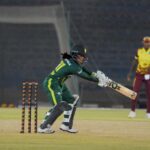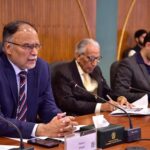ISLAMABAD, Nov 14 (APP): As Pakistan has been leading the call for rich nations to compensate poor countries for a crisis they did not cause, the experts believed that just having put loss and damage onto the climate agenda at COP27 held in Egypt was a “huge achievement” for the country.
Pakistan, which has been battered by climate catastrophes for the past decade, is responsible for less than 1 percent of global carbon emissions but is among the most vulnerable to extreme weather events, a US-based magazine Foreign Policy said in a recently published article.
Written by Australian journalist and columnist Lynne O’Donnell, the article said that summer’s monsoon rains and floods inundated one-third of the country, destroying farmland, displacing millions of people, and killing nearly 2,000. Economic losses have been estimated at up to $40 billion.
The author referred to Prime Minister Shehbaz Sharif’s address at 27th UN Climate Change Conference, or COP27, in Sharm el-Sheikh, Egypt, last week, who said Pakistan is a “victim of something with which we had nothing to do … a man-made disaster.”
As a vice chair of COP27, PM Shehbaz pressed the case for a “loss and damage” financial mechanism that would oblige developed countries to help “victim” countries pay for the impact of climate change and to prevent energy-poor countries from becoming part of the problem by transitioning to cleaner sources of energy.
The idea of rich countries helping to cover less developed countries’ costs of coping with climate change has been around in force since at least COP15, held in Copenhagen in 2009, effectively dividing the world between the haves and the have-nots. But for Pakistan, this year’s carnage wasn’t its first rodeo: It also suffered devastating floods in 2010, which caused similar amounts of damage and loss of life.
Lynne O’Donnell said the climate finance is meant to help prepare countries to adapt to coming climate shocks and to take steps to mitigate their own emissions.
The article quoted journalist and climate activist Afia Salam saying that due diligence and stringent monitoring were key to overcoming any trust issues about the disbursement of funds.
To a question by the author, she said, “Political instability cannot stop the track of recovery and development. Most fund disbursement is tied to milestones and transparency mechanisms.”
At COP27, the question of how richer countries can help underwrite the climate challenges of poorer countries has dominated much of the first week. As always, the debate has centered on the details of distributing any aid money, and the question of financing short-term fixes versus longer-term investments in mitigation and adaptation measures.
A report prepared for the latest summit suggests that developing countries, not including China, will need about $1 trillion a year of outside climate financing.
Still, just having put loss and damage onto the climate agenda in Egypt is a “huge achievement” for Pakistan, said Abid Qaiyum Suleri, the executive director of the independent Sustainable Development Policy Institute, based in Islamabad. That doesn’t mean he’s optimistic the talk will lead to anything concrete just yet.
“All over the world climate change is causing loss and damage—floods in Pakistan and the Philippines, the heat wave in Britain, cyclones in Florida. The discussion is needed, and I’m hopeful that a mechanism will emerge from these discussions—though we will not see it implemented immediately,” he said, as the journey from concept to global consensus on action can be long and tortuous.
As Pakistan nears winter, he said, some 8 million people who lost their homes in the summer floods—with seven to eight times the usual monsoon rain, much of it dumped on arid Baluchistan and Sindh—remain in temporary shelters. One million pregnant women need medical care, and millions of children are going without vaccinations, including for polio, which remains endemic in Pakistan.






